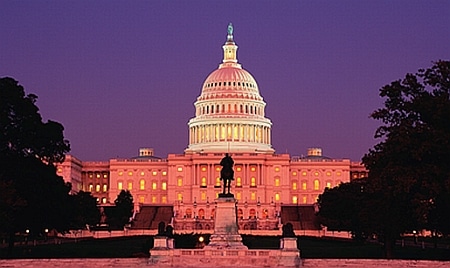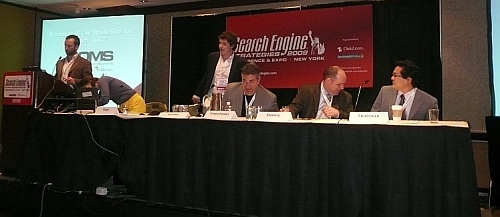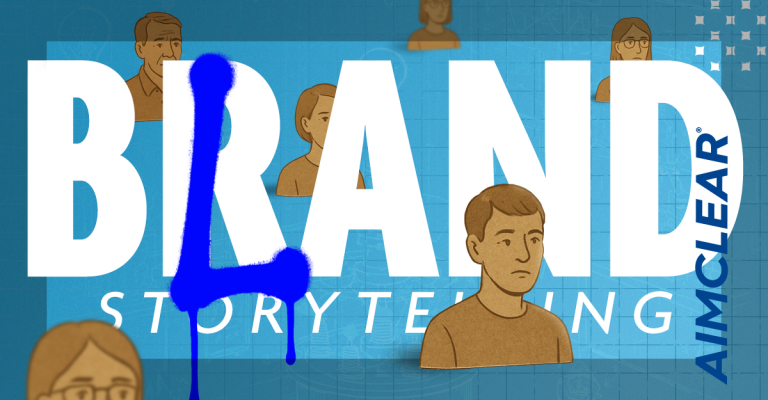
Political Search: Preparing for Search in 2010 was the “sleeper” session at Search Engine Strategies New York 2009. Gathered together were the search marketing figures directly involved in shaping the American political landscape through the 2008 presidential election, primaries, U.S. senate races and D.C. advocacy groups.
As a search marketer highly interested in politics, I appreciated the historical significance of both the panelist’s body of work and what they shared with the lucky SES audience. What followed was an insiders account of the political search game, personal insight into the symbiotic strands of influence between search and the news media, amusingly clever paid search tactics, and even some career advice.
Moderating this session was Kate Kaye, senior editor of Clickz News. The expert panelists consisted of Josh Koster, managing partner of Chong Designs LLC ; Eric Frenchman, founder of PardonMyFrench; Colin Delany, Epolitics.com’s founder and chief editor; and Mark Skidmore, Blue State Digital’s director of advertising & promotion.
The following largely paraphrases audience questions and speaker responses as accurately as possible
Kate Kaye: Let’s start off by telling everyone about what you’ve done.
Josh Koster: My most notable client is Al Franken.
Eric Frenchman: Any ad online for Senator John McCain in the last 3 years, I’ve also done work for the RNC and the RNCC.
Colin Delany: Political advocacy space, mostly in D.C. working with nonprofits. I also run epolitics.com.
Mark Skidmore: I’m the director of advertising for Blue State Digital, we also built barackobama.com and change.gov.
Kaye: I’m sure there are people in the audience wondering, is there an opportunity for me to get into the political search market, how do I go about finding political clients, is the market big enough for me to get into?
Frenchman: I don’t mind the competition, there is more room, but realize you can’t just walk into the political environment and say “here I’m available!” There are lots of companies that do it, your best bet is to hook in with someone that’s already doing it, just like Washington, it’s about who you know.
Kaye: Remember that there are so many little campaigns around the country, not just every four years. How do you approach search from a small town politician or state wide perspective?
Delany: Work with regional companies, pick the space and find connections. Elections come and go, but non profits are there all the time.
Kaye: It’s not just what we think of as “nonprofit”, like Greenpeace; it’s trade associations and all sorts of collectives wanting influence on capital hill and statewide. What impact has Google grants had on search, what do you think of it?
Skidmore: Google grants is a free program. Google will give you $10,000-40,ooo a month in free advertising for non-profits to bid on keywords; it’s great because it’s free money and free traffic. You can raise awareness for your organization for free, I have a lot of 5013c clients, you can go to www.google.com/grants and fill out the application there. It is harder to maintain a grant campaign though, because of the $1 CPC bid maximum.
Delany: What’s the turn around time on grants? Some people can get turned downed by Google for reasons not entirely “transparent.”
Skidmore: Right, not exactly transparent. Turnaround time is 3-6 months, but it pretty much lasts forever.
Kaye: That’s a lot.
Skidmore: If you max out at 10 grand you can go up to 40 grand.
Kaye: I was speaking with a source about the way he gets new clients. He takes care of securing Google grant money for potential clients in advance.
Kaye: Can you speak on some differences between running campaigns for nonprofit and commercial campaigns. How is turnaround time different?
Koster: There’s not a whole lot of money, the best way to maximize your budget is to buy keyword terms as they become keyword terms during the course of the campaign, ex. “joe the plumber”. But if you want to get into political, ask yourself if you want to be getting calls late at night asking you to read news alerts.
Frenchman: McCain’s headquarters were in New Jersey by the airport, McCain’s hotel was in downtown Minneapolis. I had to run to the headquarters, after some bad press about Sarah Palin, they asked me to build a keyword campaign for Sara Palin. I basically had to start a campaign bidding on every negative term related to Palin, one of the worst ones was “palin nude photo.”
Kaye: That couldn’t have been the most derogatory one. (audience laughs)
Frenchman: Money was no object. You can’t wait for TV, there’s no time to do it, you have people standing over your shoulders asking “is it fixed yet?” McCain mentioned Joe the Plumber and in 15 minutes we had the ads running.
Skidmore: I remember literally sitting and watching CNN for 20 hours during the William Ayers thing, trying to keep up with the news. Often times you don’t know what terms you have to bid on in politics, media drives so much of search. It’s not just about being responsive with the messaging, but also about maximizing your budget, we were held to really strong ROI goals.
Kaye: Another thing you deal with is not only media reaction, but that people are always observing your every move, in regards to search advertising. Any reporter can do a search on “Obama healthcare”, maybe see a negative ad, and then have fodder for a story.
Skidmore: We were working for America’s Voice which was advocating for immigration reform, and were bidding on a reform candidate’s name. We used a landing page about immigration reform and it actually got picked up as a story, so there’s than earned media advantage.
Audience question: What exactly do you measure for ROI? Dollar amounts?
Everyone: Donations.
Frenchman: Four dollars in donations for every dollar we spent, I had to explain myself when it dropped below four.
Delany: Obama’s guy got a 10-15 fold return on Barack Obama ads. On the advocacy side it’s not so much fundraising, but you’re trying to build advocacy lists and comparing it against other list acquisition methods. Google ads can save you money.
Skidmore: That (10-15 fold return) was misquoted, it was sort of a range, but I agree, it’s also about your lists, right now campaigns do a poor job of tracking the overall holistic picture.
Koster: I couldn’t agree with that more. What is the average expected return on investment on an email address? Email addresses equal money, but one step further, we found a lot of success on 2nd tier engagement. When people were searching for a local veterans hospital, or someone searching for animal vet, we could message them about an issue related to their search, targeting things that didn’t convert.
(continued) Campaigns that convert the most are around keywords based around your candidate’s name. But what people search for tells us things about them; they are a veteran or a father. If you do ads not directly based on their query, they might not necessarily land and convert, but once you start driving a good amount of traffic around their concerns, then they search for the candidates name and ultimately convert. And we can actually confirm this with cookie tracking.
Kaye: Quality scores, Google sees you targeting an ad for both Franken and the person searching for veterans hospitals in Minnesota. How do you deal with low quality score to achieve your goals?
Frenchman: When you’re getting low quality score from Google, it’s usually from longtail words your candidate doesn’t have much info about, but wants to associate branding with. For McCain we ran campaigns around NASA, education, even stuff without correlating content; we wanted to have that brand awareness. And the reversal is, it’s a competitive advantage, hard for others to break in.
Koster: The great thing about long tail, you’re not competing with commercial interests, you might be the only person bidding on a keyword or set of keywords.
Frenchman: For McCain we even bought terms around “eBay”, bought them just to have ads show up while people were searching, it was like minimum bid of $5.00. We just needed for people to see it, money didn’t matter. We did it on keywords like”Yahoo” too.
Skidmore: Politicians are narcissistic, they constantly Google themselves. They get people to try and track down who runs the ads. Google is a very effective way of getting people to notice what you are doing.
Koster: Keyword based context advertising is the perfect medium for 2nd tier tying your brand to an issue. Quality score is irrelevant, especially with Google email. Anyone with an Obama email in their inbox, you could target them in Gmail adspace.
Frenchman: You can actually do a lot of advertising in the content network, like for 25 cents. By the end you could actually do almost anything.
Skidmore: Content networks work for political/advocacy, a lot higher click through ratios for us, higher than running corporate ads in the content network.
Frenchman: We would use the content network purely through banner and video ads, we didn’t use any text ads.
Audience question: Social media and organic were treated much differently between McCain and Obama. And how do you find a conversion, is it an email in the email list, or is it more than that?
Kaye: Second question first, what are conversions?
Skidmore: Donations, email list growth, people signing up for your social network, how many people can you get to rally in Iowa, there’s an offline component.
Frenchman: At its basic level it’s all of that. At events it’s register a vote, refer a friend.
Skidmore: These type of efforts are happening offline, you spend 2 dollars and we’ll get you an email address.
Delany: Email, that’s shorthand for getting these people in your database. From there it’s, what can you get them to do? At every tier you’re asking people to do more.
Kaye: The first question is a discussion that could go on for hours, how from an SEM perspective are you collaborating with these types of social media marketing teams?
Frenchman: When you go back and look through data on Facebook, McCain had like 600,000 friends, that’s an enormous sum. If it wasn’t for Obama, nobody would be laughing at McCain for that accomplishment. Senator George Allen with the “macaca moment“, that video was posted on Youtube, and it’s the one effort you can point to that completely took down a politician, he probably could’ve run for president.
Skidmore: Like “miserable failure” for George Bush. Ron Paul did an amazing job rallying links, he gained a lot of SEO value to his site. Corporate clients have a hard time with link building strategies, but with politics people naturally care about issues, it’s much easier to link build. With all the citizens journalists that continue to write content, Barack Obama attained more links in a year than a major corporation’s lifetime effort.
Koster: The press cares more about the horse race than the issues, they can write horse race articles about Facebook friends, Youtube videos, who’s got better social media judged by your Youtube viewer count. You can use ads to seed that, view counts etc. and it’s a good way to put the press to bed.
Kaye: Let’s talk about landing pages. With the huge number of landing pages political campaigns have, like Obama’s multiple web domains; can you talk about the differences of having to monitor and manage those vs standard corporate campaign?
Frenchman: From corporate to political, we would go through issues and literally create landing pages during the primary season. A No Surrender Tour built around the war in Iraq, a microsite around Islamic Militancy; these things have very short lives, they go away within a week or two and you might have a dozen pages around one issue. We also had a Joe the Plumber page built within 15 minutes of the first media mention.
Koster: Campaigns generate an enormous amount of comments. When you’re not trying to do direct acquisition, you can let the the raw communication drive the content.
Frenchman: Every day I was creating a new ad campaign. Every time there was a new endorsement, it was going to a press release landing page. There’s a million ways to misspell Schwarzenegger. (audience laughs)
Delany: Would you ever send out to user generated content?
Frenchman: Videos.
Koster: When you have that much UGC being created, you need the content in a database. It’s very important when the websites are built in the first place, that they give us the ability to pull content and “slice and dice” it for repurposing.
Audience question: What content management systems did you use?
Koster: My firm has an in-house CMS, we use WordPress for other content.
Delany: Know your pre-approved content. If your client says something even a little off, it can be a problem. Have a pool of content already vetted that the communication staff is comfortable with.
Audience question: When you talk about multiple landing pages, multiple domains, are you running keywords on multiple accounts, like 5 or 6 ads running for the same set of keywords for different microsites?
Frenchman: We’d never do something like that, Google doesn’t let you do that. (audience laughs) Actually, somebody from the Obama campaign flagged us to Google on that, but I did that most of the primary season and no one noticed.
Koster: A blog called Openleft.org did a “run your own media campaign”, they said “buy these terms and run one of these ten ads.” There’s no connection between the people that did this except that they all read the blog, the end result is several ads run by separate but agreeing organizations. Imagine if you’re running a campaign for a congressman that doesn’t have his ads up, all of a sudden 10 people go out and buy your candidates names, any time your congressman is mentioned in article, all that Adsense adspace is hating on him, you can really create a shadowy impression.
Audience question: What do you do when you have a client that says “One week, I don’t care how you have to do it, just move the needle.“
Frenchman: I was running McCain’s campaign when he was running a PAC, and I think I had to wait for only one ad to be approved, because it was controversial. I had no approval process, when I saw Joe the Plumber I had to move. I was driving my daughter to a playdate when I heard Fox news talking about ACORN, I didn’t immediately understand it but I knew it was something to do with fraudulent voter registration. Right after I dropped her off I created a whole campaign around Obama and ACORN, waited a week, and it became a big issue. Literally you don’t have time and sometimes you don’t have enough money.
Kaye: That kind of free reign can’t be normal?
Frenchman: Only with McCain and the RNC was I allowed to do that.
Kaye: Were any of you on more of a tether?
Skidmore: With John kerry, my director asked “can you just do it?”. It was a strategy of just real basic creative. Very “fly by seat of your pants with your CNN IV-hookup” stuff.
Delany: It depends on the culture of the organization you’re working with. Some have strict guidelines, some nitpick.
Koster: It depends on the need, some smaller races get news only every 3 days.
Frenchman: Nobody new who McCain was going to run with, we had set up like 5 potential VP websites, bought campaigns for McCain-Romney etc., none for Palin. I got a call at 6 in the morning saying “make it happen, but don’t hit it until you actually see McCain on stage with Palin.” I remember Danny Sullivan calling me out on the whole thing.
Audience question: How much money did you spend on search and what’s your business model?
Skidmore: We didn’t make money off media buys, we made money around supplying technology to run the site and consulting.
Kaye: I tallied that Obama filed $7.5 million that went to Google, half of it was more content network and half was search. Same thing for McCain, Eric spent tons of money.
Frenchman: So your question is, “how much money can I make and how much money is in the pot right?” Forget about political campaigns; for a senate race with a guy that “gets it” you’re lucky to get $5,000 a month on search. I had a guy that wanted to run a search campaign on a dollar a day. It all depends on who it is, you’d like to get 15% for media buys, but for somebody you’re in bed with, someone you want to see win, you’ll do rock bottom rates.
Koster: I can’t say, it changed month to month, a couple hundred for congressional and few thousand for senate. When we do charge on commission, it ends up being 15% or sometimes higher. We’ll take on a $1,000 test budget, knowing what we can show and then we can get them to spend 10x as much.
Delany: Contrast that with one Google grant going on year after year. A friend of mine said, “don’t get into the political space, stay in advocacy.”
Frenchman: You got to pick the horse, and you have to pick the right horse, if it’s the wrong horse you’re out. I picked McCain from the beginning, if you pick the wrong guy, you might get picked up by the other campaign, but most likely you’re done
Koster: One more way to make money we haven’t discussed is when the final days are upon you and the opponent goes and throws down a $20,000 buy on a newspaper, within minutes you have your own $20,000 mediabuy on the newspaper’s website; it’s a tit for tat thing. The amount spent in 2010 is going to go up astronomically.









